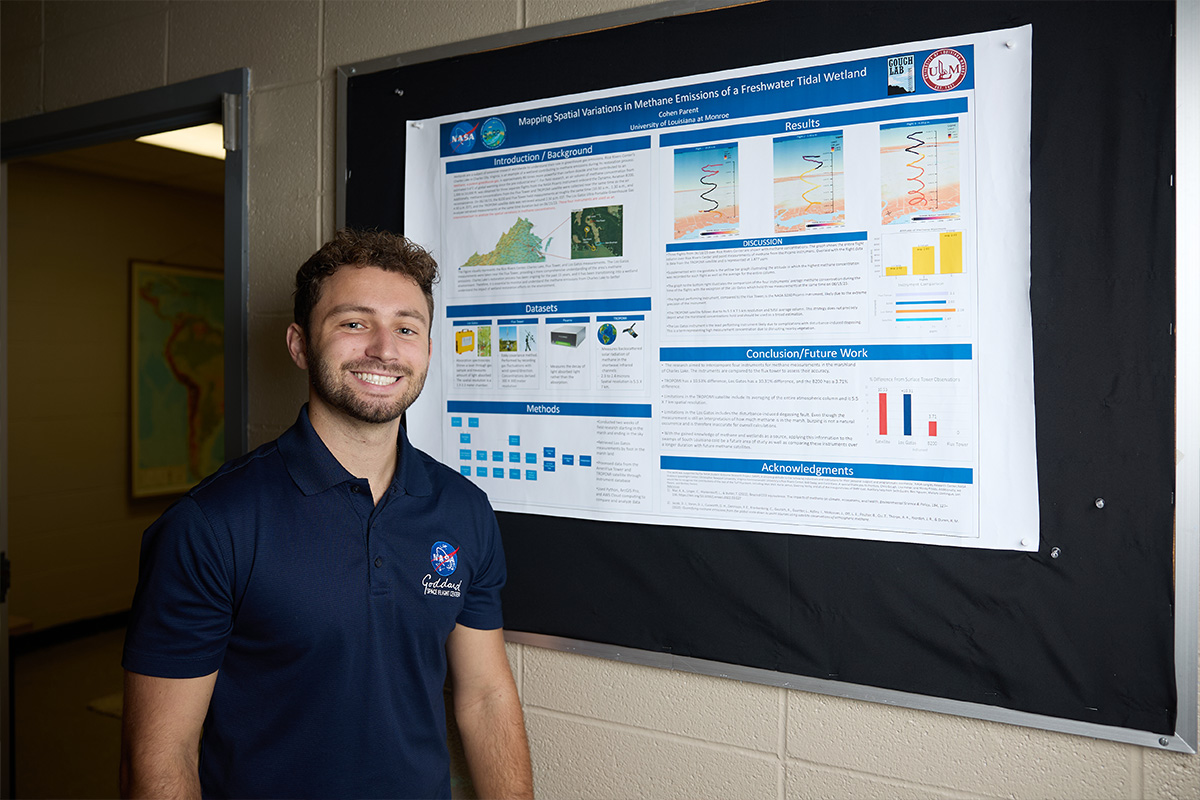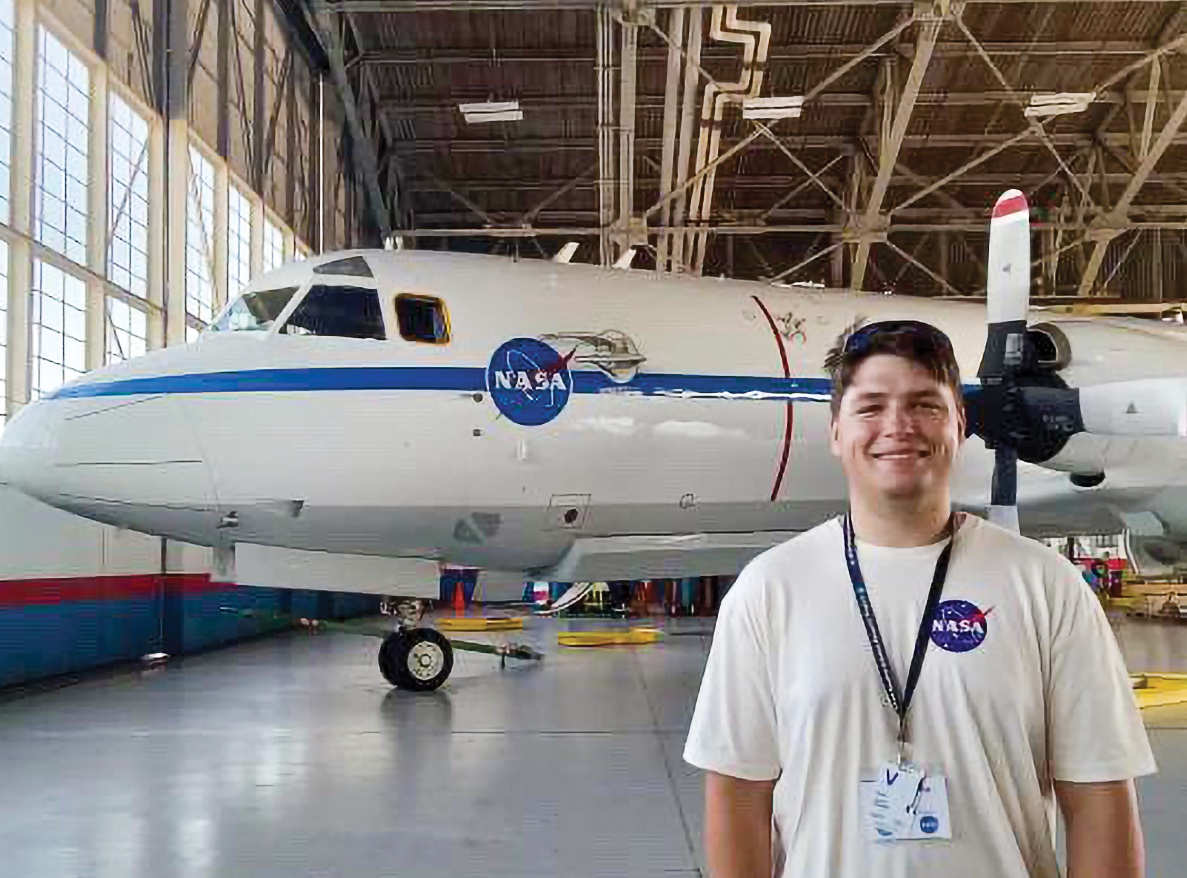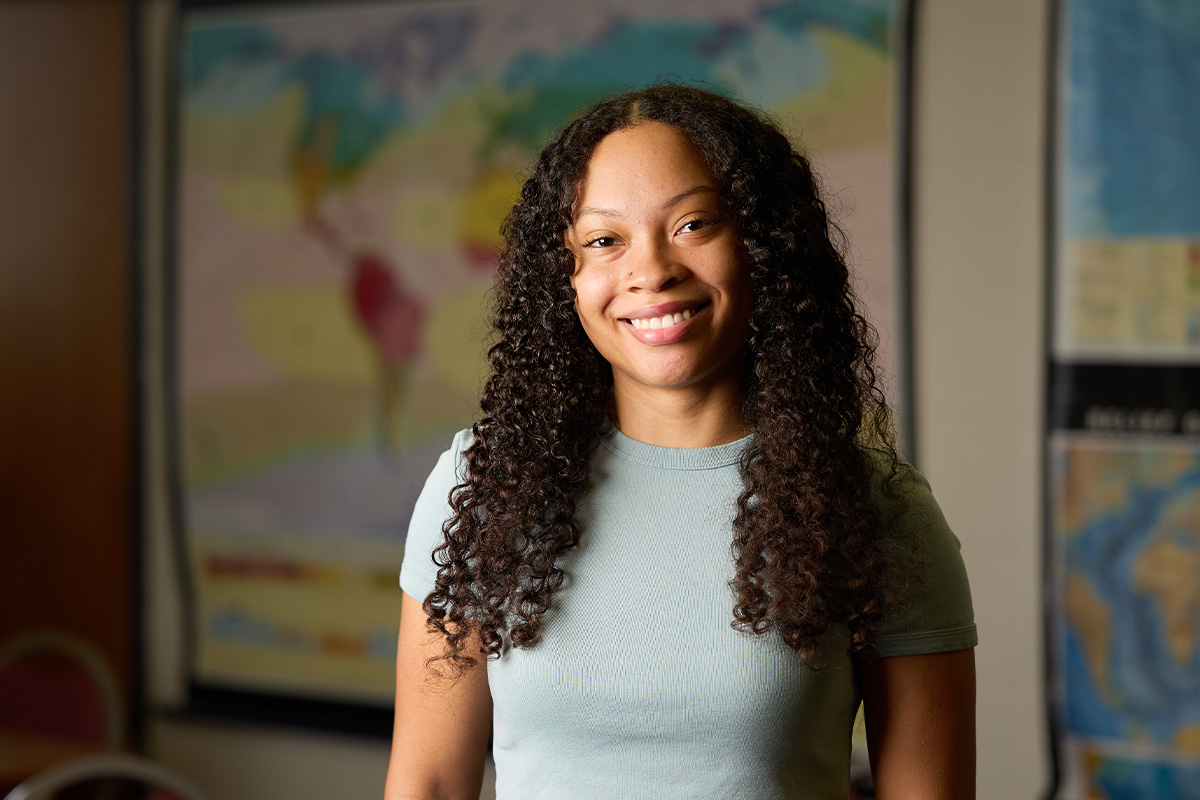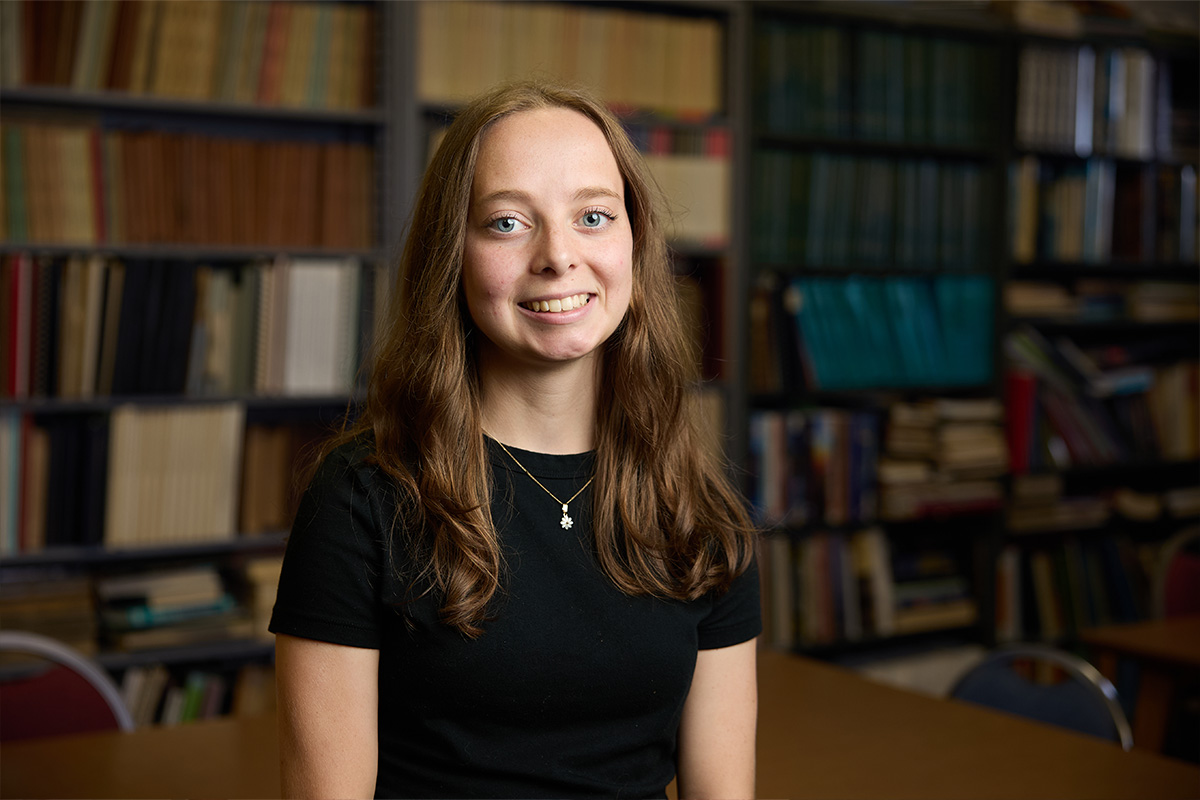Published October 9, 2024
Editor’s Note: This story will be featured in the 2024 edition of the ULM Magazine, which will be available later this month. Additionally, this edition of the ULM Magazine features highlights from across the university, including stories about ULM’s recent enrollment increase, the forthcoming Occupational Therapy Doctorate program, alumni spotlights, and more. Alumni Association members and donors will receive a copy of the magazine in the mail, but free copies will also be available in the
Office of Marketing and Communications, Room 205 in the ULM Library. Stay tuned to ulm.edu to find out when the magazine is available and to view the complete digital edition.
by Adam McDonald
The ULM Atmospheric Science Program, housed in the School of Sciences in the College
of Arts, Education, and Sciences, is the only program of its kind in the state. Students
choosing the Atmospheric Science program are exposed to a variety of professional
opportunities even before graduation. These competitive internships and research projects
allow students to have hands-on experience with state-of-the-art equipment in a variety
of settings.
“Internships and research projects like these provide students with opportunities
to experience real-world research science and to see the connections between the content
areas they are studying,” said Dr. Anne Case Hanks, Director of the School of Sciences
and Associate Professor of Atmospheric Science.
Dr. Todd Murphy, Associate Director of the School of Sciences and Associate Professor
of Atmospheric Science, says these internships allow students to create connections
on a regional and national level. “In addition to the new knowledge and skills gained, these opportunities allow the
students to expand their professional network, which may be critical to landing that
first job or getting into graduate school,” said Murphy.
Each year, the ULM Atmospheric Science program places students in these unique opportunities
to expand upon what they have learned in the classroom. These are a few examples of
how ULM is training the next generation of atmospheric science professionals.
Cohen Parent and Jayce Crayne – NASA Student Airborne Research Program – Virginia
 |
| Cohen Parent |
Cohen Parent is a senior Atmospheric Science major from Prairieville, La, set to graduate
in December 2024. In the summer of 2023, Parent was selected to attend the NASA Student
Airborne Research Project (SARP) in Hampton, Va. and the surrounding areas.
Parent was one of 53 interns selected from a pool of over 500 applicants nationwide.
His cohort of 23 interns made up the East side of the program, while the interns from
the West side were in California.
While part of the program, Parent was housed at Christopher Newport University near
Hampton where he conducted individual research and analysis. He also split time between
the nearby NASA Langley Research Center and the NASA Goddard Space Flight Center in
Washington, DC, where the team conducted field work and held meetings and discussions.
Parent says the main idea of the internship program was Earth System Science, which
he describes as “the dynamics, biological processes, and physical processes of the
atmosphere and other systems in the earth and how they play an intricate role with
one another.” Parent’s specific task on the project involved researching the methane
content of a freshwater tidal wetland in the Chesapeake Bay region and how it interacts
with the surrounding atmosphere.
“I was able to physically go into the marshland and get tangible data with remote
sensing equipment,” said Parent. His hands-on experience was not limited to the ground.
Parent was able to board a B200 aircraft to capture a 10,000-foot vertical profile
of the methane in the atmosphere. In the air, he was responsible for working with
a Picarro Gas Concentration Analyzer, an instrument mounted to the wing of the plane
that allows outside air to funnel into the instrument, which then uses a laser to
measure the chemical compounds in the air.
The results of Parent’s research were compiled into a presentation poster which he
presented at NASA headquarters at the end of the internship program. The poster, titled
“Mapping Spatial Variations in Methane Emissions of a Freshwater Tidal Wetland,” is
currently on display on the third floor of Hanna Hall on the ULM campus.
Parent will use his experience at NASA to inform the next steps of his education and
career. He is set to graduate in December 2024 with a bachelor’s of Atmospheric Science.
He is interested in pursuing a master’s degree in Aerospace Engineering or Mechanical
Engineering.
 |
| Jayce Crayne |
In the summer of 2024, Jayce Crayne, an Atmospheric Science major from Prescott, Ark.,
was also selected to participate in the NASA SARP program. Crayne said he became interested
in the opportunity after hearing about Parent’s experience in 2023. Crayne, who is
minoring in chemistry, said, “I was really looking for an internship that would apply
to my background.”
Crayne was fortunate to get the experience he was looking for, as his work with NASA
allowed him to fly in a B200 and become acquainted with atmospheric measuring equipment.
After receiving instructions on how to use the equipment, the students were given
the chance to use it for themselves. “They gave us the freedom to coordinate our own
data collection, which was really valuable,” said Crayne.
While Crayne’s internship experience did not directly mirror that of Parent, he was
in many of the same locations including Christopher Newport University and the NASA
Goddard Space Flight Center in Washington, DC.
For his final individual project of the internship, after consulting with his faculty
mentor, Crayne landed on a project focused on how Saharan dust in the atmosphere can
affect the moisture content of the air.
Crayne said he spent a large part of the project learning how to code and analyze
data, which was a first for him. He was able to analyze data that had been collected
from a site in Florida in 2020 and input it into a software program called Python
that allowed him to create a conceptual model to study how the dust affected the atmosphere.
His final findings were presented to his peers in the program, as well as many NASA
employees and researchers.
"This experience really taught me what the research process is like. I thought it
was a really intricate problem to tackle, and it was the first time that I really
took something and made it my own,” said Crayne.
Crayne says the internship built his confidence as a researcher and will allow him
to challenge himself going forward. “If you had told me I was going to write 100 lines
of code in Python and be able to read and splice data and make a chart, I would have
thought you were crazy. I did not know I was capable of doing something like that,”
said Crayne.
After graduation in May 2025, Crayne says he is open to whatever possibilities may
arise, whether that be graduate school or working in the public sector with NOAA or
the National Weather Service.
Haniston Holloway and Emily Allen – NOAA/NWS Storm Prediction Center – Norman, Okla.
 |
| Haniston Holloway |
Haniston Holloway, a senior Atmospheric Science major from Mesquite, Texas and Emily
Allen, a senior Atmospheric Science major from Alabaster, Ala., both participated
in internships at the National Weather Center in Norman, Okla. as part of the NOAA
(National Oceanic and Atmospheric Association) Ernest F. Hollings Scholarship Program.
Holloway’s project involved collaborating with the Storm Prediction Center (SPC) and
National Severe Storms Laboratory (NSSL) to create a supercell database. The database plots tracks, or the location, of supercells onto a map along with the
tornadoes associated with them. Once this database is completed, it will create a
baseline for a variety of supercell research.
“This experience has prepared me for the future by instilling my love for research
and allowing me to better understand how vast the field is and continues to grow,”
said Holloway. “There is so much more to discover and learn about weather which affects
people every day,” she added.
 |
| Emily Allen |
Allen’s project during the internship focused on analyzing public information needs
prior to severe weather events. The research-based project found Allen manually analyzing
social media comments to determine the types of questions the public was asking during
severe weather events. “Results from this study will hopefully help meteorologists
determine what types of information to include in their communication with the public
so that people can decide how to respond before severe weather impacts them,” said
Allen.
“This internship gave me the opportunity to take a piece of a larger research project
and make it my own while collaborating with other scientists in both social science
and meteorology. It affirmed what I want to focus on in grad school and gave me some
incredible connections that I hope to maintain throughout my career,” stated Allen.
Both Holloway and Allen will graduate in May 2025 and both plan to pursue a master’s
degree.
Alec Soileau– FARM Radar Institute – Center for Severe Weather Research – Boulder,
Co.
Alec Soileau, a senior Atmospheric Science major from Breaux Bridge, La., participated
in the 2nd Annual FARM Radar Insitute hosted by University of Illinois Urbana-Champaign at the
Center for Severe Weather Research in Boulder, Co. during the summer of 2024. Soileau
was one of only 12 students selected to participate from a field of 60 who applied
for the institute. He was also joined by ULM Atmospheric Science major Trey Holiday.
The eight-day institute allowed Soileau to learn from leading researchers through
lectures and also through hands-on field research with cutting-edge equipment, which
included a COW, or C-Band on Wheels, radar. The COW Radar is transported on a modified,
medium class 18-wheeler and must be reassembled at each site. Soileau and the other
students and instructors traveled to the eastern plains of Colorado, which provided
a more favorable environment for storms.
In addition to assembling the pieces of the large radar, Soileau learned how to use
the equipment to collect data, later using the data to create a project summary. In
the process of creating his report, Soileau was able to use industry-standard software
to view and edit radar data. Soileau says he feels his experience with this equipment
and software will position him well to be successful in his future career or graduate
school.
After graduation in May 2025, Soileau plans to pursue a master’s degree. “I want to
continue to do research with radars, which is why I was very excited to get to attend
the FARM Radar Institute to give me a foot in the door of radar research,” said Soileau.
Despite the variety of the types of internships each student participated in, they
all agree that ULM Atmospheric Science faculty made them well-prepared.
Parent credits his professors Dr. Anne Case-Hanks, Dr. Todd Murphy, Dr. Ken Leppert,
and Dr. Tyler Fricker, with giving him the prerequisite knowledge to excel at NASA.
“They are all so engaged and so passionate about what they teach, it allows me to
engage in their classes,” he said.
“My professors were always willing to answer a question, whether it be simple or
complex and talk with me through topics that I didn’t understand. Everything I learned
from them translated to what I did in my internship,” said Jayce Crayne.
“They do a very good job in teaching us the material in a manner you can understand
and apply,” said Alec Soileau, who has worked with Dr. Todd Murphy as an undergraduate
research assistant since his freshman year. Soileau praised Murphy for allowing undergraduates
to assist with research, which isn’t typical in other atmospheric science programs.
“It really helps us get experience that prepares us for graduate school and beyond,
said Soileau.
“Working on field campaigns within the ULM Atmospheric Science program and undergraduate
research introduced me to my love for research, and my internship experience has only
heightened it,” said Haniston Holloway.
“Three years ago, when I started at ULM, I never thought I would have an opportunity
like this, and I don’t think I would have without the professors we have in the atmospheric
science program,” said Emily Allen.
The goal of any undergraduate program is to successfully prepare its students for
the next steps of their education or career, not just with knowledge learned in the
classroom, but also with the creation of opportunities. The ULM Atmospheric Science
program is continually readying its students for the careers of tomorrow.




